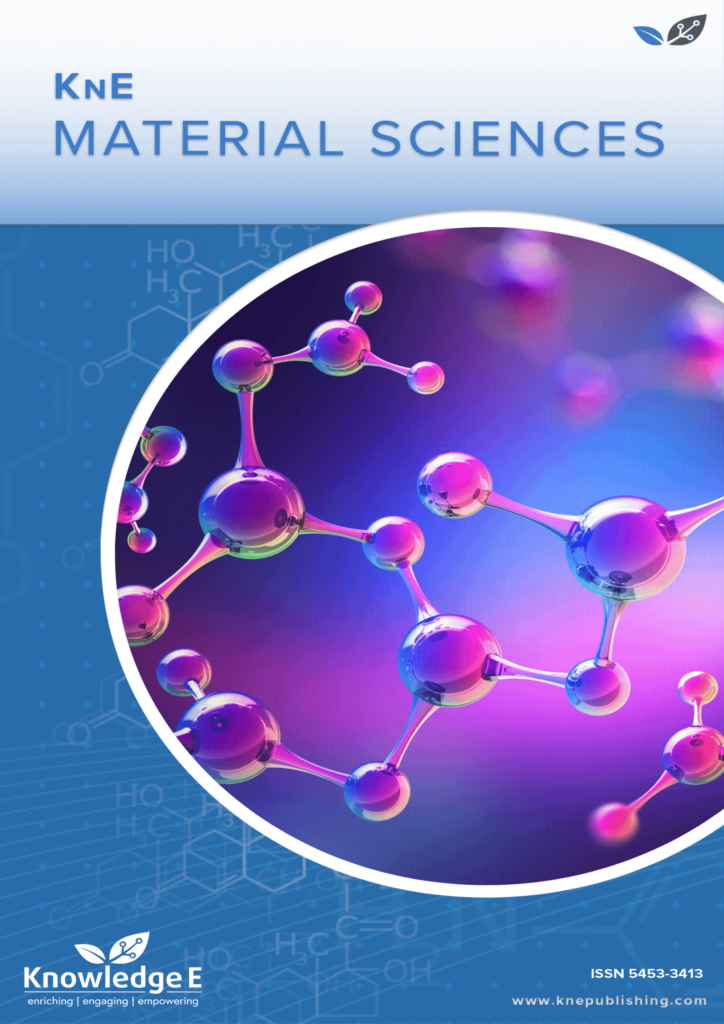
KnE Materials Science
ISSN: 2519-1438
The latest conference proceedings on physical materials, energy materials, electrical materials.
Leaching of Waste Hydroxide Sludges by Complex-Forming Agents
Published date: Sep 03 2017
Journal Title: KnE Materials Science
Issue title: Technogen-2017
Pages: 34-38
Authors:
Abstract:
In the paper the problem of utilization of stale hydroxide sludges containing non-ferrous metals and arsenic is considered. It is proposed to carry out two-stage leaching of sludges by solutions of complexing agents with recovery of 97-99% of non-ferrous metals to solution and removal of arsenic in the form of sparingly soluble compounds suitable for burial.
References:
[1] R. Salhi, M. Boudjouada, S. Messikh, and N. Gherraf, “Recovery of nickel and copper from metal finishing hydroxide sludge by kinetic acid leaching,” Journal of New Technology and Materials, vol. 6, pp. 62–71, 2016.
[2] V. Sridhar and J. K. Verma, “Recovery of copper, nickel and zinc from sulfate solutions by solvent extraction using LIX 984N,” E-Journal of Chemistry, vol. 8, no. 1, pp. S434– S438, 2011.
[3] A. Angela, Marc-Peter Hofmann, US 14/364,372, 2014.
[4] P. R. Dwivedi and J. Verma, “A novel chelating resin with diphenyl disulphide functional group: Synthesis, sorption, separation and recovery of some heavy metal ions,” IOSR Journal of Applied Chemistry, vol. 7, no. 1, pp. 57–63, 2014.
[5] M. C. Vilarinho, F. Castro, and A. Ribeiro, “Small sized pilot scale experiments on the recovery copper and nickel hydroxide from galvanic sludge,” in Proceedings of the 1st International Conference Wastes: Solutions, Treatments and Opportunities, 2011.
[6] S. Taihong, Z. Shujian, L. Jinfeng et al., “Separation and Recovery of Nickel and Copper from Multi-Metal Electroplating Sludge by Co-Extracting and Selective Stripping,” Journal of Civil Environmental Engineering, vol. 1, 2011.
[7] J. Cui, Y. Du, H. Xiao, Q. Yi, and D. Du, “A new process of continuous three-stage co-precipitation of arsenic with ferrous iron and lime,” Hydrometallurgy, vol. 146, pp. 169–174, 2014.
[8] Q. Ashton Acton (Gen. Ed.), Ethylenediamines - Advances in Research and Application: 2013, ScholarlyEditions, Atlanta, 2013.
[9] N. Shaimardan, N. A. Kulenova, S. V. Mamyachenkov, and O. S. Anisimova, “Study of Zinc-Lead-Containing Cake Leaching Features,” Metallurgist, vol. 59, no. 7-8, pp. 740–743, 2015.
[10] S. V. Karelov, A. R. Barashev, O. S. Anisimova, and S. V. Mamyachenkov, “Investigation of the selective leaching of cadmium from the active mass of alkali accumulators,” Russian Journal of Non-Ferrous Metals, vol. 51, no. 2, pp. 94–96, 2010.
[11] E. Artur and M. Martell Robert, Critical stability constants, Volume 3: Other Organic Ligands, Springer Science + Business Media New York, 1977.
